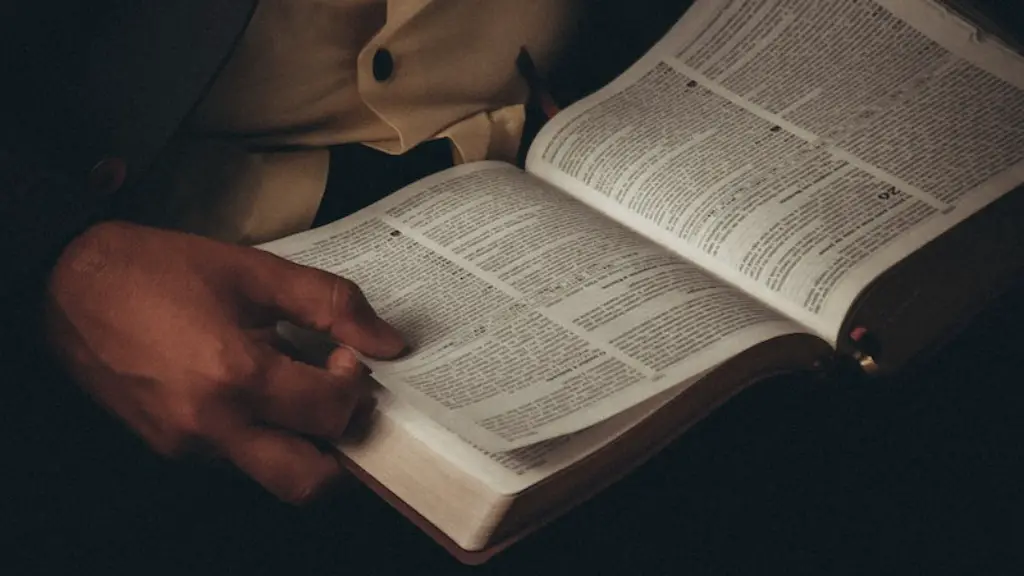The Bible has a lot to say about widows and their place in society. In the Old Testament, widows were often left destitute and without any means of support. They were often taken advantage of by their neighbors and had no one to turn to for help. The book of Ruth tells the story of a widowed woman who was taken in by her husband’s family and given a second chance at life. In the New Testament, Jesus showed great compassion for widows and regularly interacted with them. He even went so far as to say that anyone who mistreated a widow would be under God’s judgement. The Bible is clear that widows are to be treated with respect and compassion.
The Bible tells us that widows are to be treated with compassion and respect. James 1:27 says, “Religion that is pure and undefiled before God the Father is this: to visit orphans and widows in their affliction, and to keep oneself unstained from the world.” The book of Proverbs also has much to say about how we are to treat widows. In Proverbs 31:8-9 it says, “Open your mouth for the mute, for the rights of all who are destitute. Open your mouth, judge righteously, defend the rights of the poor and needy.” Many other verses throughout Scripture tell us to take care of widows and orphans, and to show them compassion.
What God says about widows in the Bible?
This is a beautiful passage that speaks of the protection and love that God provides to those who are in need. He is a father to the fatherless and a defender of widows, and He will cover His children with His feathers and provide them with refuge. His faithfulness will be their shield and rampart, and they can rest assured that He will never leave them or forsake them.
The term almanah is used in the Old Testament to refer to widows who have been exploited and abused. This term is used to depict the desolation and isolation that these women have experienced from God. The Book of Job uses the exploitation of widows to exemplify human iniquity. Other passages from the Old Testament apply the term almanah to cities such as Babylon and Jerusalem to depict their desolation and isolation from God.
What does the Bible say about taking care of a widow
James 1:27 is often cited as a key passage on the Christian view of social responsibility. In this verse, James says that true religion includes taking care of orphans and widows who are in distress. This is significant because it shows that Christians are called to do more than just avoid sin; they are also called to actively help those who are in need. This is an important principle that should guide Christians as they think about how to best help those who are suffering.
God is the father of the fatherless and protector of widows. He shows mercy, care, and protection to orphans. They are essential to him and should be essential to us as his Church.
What does Paul say about widows?
There are many widows who are in need of recognition and assistance. However, if a widow has children or grandchildren, it is important that they learn to care for their own family first. This is pleasing to God.
Hindu society has long disallowed the remarriage of widows in order to protect what it considered family honour and family property. Widows were expected to live a life of austerity and abnegation. However, this practice has started to change in recent years, with more and more Hindu societies now allowing widows to remarry.
What is the biblical meaning of a widow?
A widow is a woman whose husband has died, and she is now responsible for her own support and that of her children. In the Bible, a widow is someone deserving of honor and extra care if she is in need.
Widowhood creates economic hardship for many because Social Security benefits and pensions from employer-sponsored plans drop. In addition, those most likely to be widowed have lower incomes than intact couples even before they lose their husbands. This is a major reason why widowhood is a time of upheaval and financial insecurity.
What is the role of widows in the church
Widows Harvest is a ministry that serves widows by meeting their needs and connecting them to the incredible power of their prayers. This prayer ministry and their ministry of service has become the two-fold mission of Widows Harvest. By meeting the needs of widows, they are able to serve churches and connect them to the power of prayer. This ministry is a vital part of the church and provides an important service to those who are grieving the loss of a spouse.
The death of a spouse is one of the most difficult things a person can go through. The following are some ways to cope with the loss:
1. Talk to a qualified counselor. The complex emotions associated with losing a loved one can be overwhelming and difficult to sort through on your own. A counselor can help you process your emotions and start to heal.
2. Focus on self-care. It’s common to lose interest in eating and cooking after losing a spouse. Make sure to take care of yourself physically and emotionally.
3. Stay busy. Keeping yourself busy can help take your mind off of your loss. Find a hobby or project to focus on.
4. Get a pet. A pet can provide companionship and unconditional love when you need it most.
5. Turn to others. Grief can be isolating. Lean on friends and family for support during this difficult time.
Is it OK for a widow to remarry?
Overall, remarrying is a personal decision that should be made between the two parties involved. If there are children involved, then the decision to remarry should be made with their best interests in mind. Adoption can make the process easier, but it is not a requirement. Ultimately, the decision to remarry should be made jointly and should not be done impulsively.
When someone is grieving the loss of a loved one, it is important to be respectful and understanding. The last thing you want to do is say something that might upset or offend them. Here are a few things NOT to say to someone who is widowed, and why:
“I know how you feel.” This may be true, but everyone grieves in their own way and to say that you know exactly how they feel is presumptuous and can be quite insensitive.
“When my uncle died/when my granny got cancer/when I got divorced etc.” Again, while you may be trying to relate to the person, this just comes across as insensitive and can be quite hurtful.
“Call me if you need anything.” This is a nice offer, but the widowed person may not feel comfortable reaching out to you for help. They may prefer to deal with things on their own or lean on other close friends and family members.
“You’re being so brave.” While courage is certainly admirable, the widowed person may not feel brave at all. They may be feeling scared, alone, and overwhelmed.
“You have to move on/get on with it/you should put your grief away
When the widow cries to God
The passage from Exodus urges us not to take advantage of widows or fatherless children, as doing so would incur the wrath of God. This is a serious matter, as God’s anger would lead to our death. This would then cause our wives to become widows and our children to be fatherless. Thus, we must be careful to not exploit those who are vulnerable.
1. Please do stay connected. It can be difficult for widows to feel isolated and alone. Staying connected with friends and family can help ease some of the loneliness.
2. Please do say you are sorry for our loss. Although it may seem awkward, your condolences can mean a lot to a widow. It shows that you care and are willing to support them during this difficult time.
3. Do call and ask specifically, “Can we go for a walk together?” Exercise can be a great way to help widows cope with stress and grief. It can also be a nice bonding opportunity for the two of you.
4. Do refer to our husband’s acts or words – serious or humorous. It can be nice for widows to hear stories about their late husband, even if they are humorous. It helps keep their memory alive and reminds them of the good times.
5. Invite us to anything. It can be difficult for widows to socialize, so invitations to events can be very helpful. It gets them out of the house and gives them something to look forward to.
6. Do accept that we are where we are. Grief is a process, and everyone moves
Where does it say God is the husband of the widows?
This is a beautiful verse that reminds us that even when we think we are alone and no one is looking out for us, God is always there watching over us. He is our defender and protector, and He takes special care of those who are vulnerable and in need. What a comfort to know that we have a loving God who cares for us, even when we are at our lowest.
In 1 Timothy 5:9, the Bible says that a widow is to be put on the list for support if she is not less than sixty years old and was faithful to her husband. This is a caring and practical way to help those who are in need.
Why older widows don t remarry
There are many widows who choose to remain single and are happy with their decision. They have had long and happy marriages and enjoy male companionship. They realize that their ability to choose the single life rests on two essential points: financial independence and the ability and willingness to live life as an individual, rather than as one of a pair.
It depends on your religious beliefs. If you believe that any sex outside of marriage is a sin, then yes, sex with a widow would be considered a sin. However, if your religion does not consider sex outside of marriage to be a sin, then sex with a widow would not be considered a sin.
Conclusion
The Bible has a lot to say about widows. In the Old Testament, God commands his people to take care of widows and orphans (Exodus 22:22, Deuteronomy 10:18). In the New Testament, Jesus speaks highly of widows, and even uses one as an example of faith (Luke 18:1-5). The apostle Paul also gives instructions on how widows should be cared for (1 Timothy 5:3-16). Overall, the Bible teaches that widows are to be treated with respect, compassion, and generosity.
The bible says that widows are to be given honor and respect. They are to be treated with compassion and kindness.





